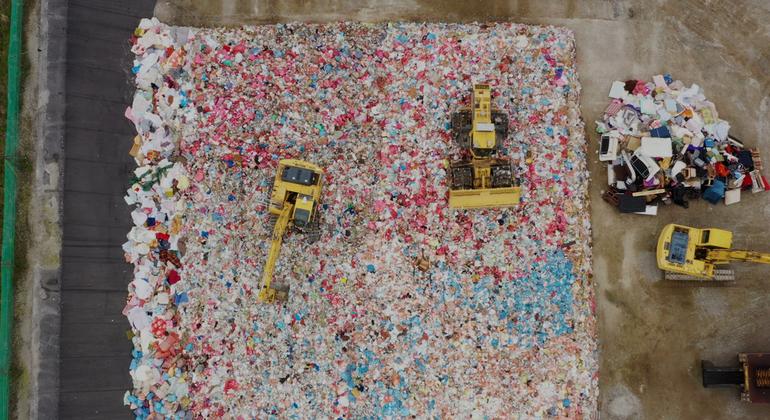Osaki, Japan is a town with a population of around 12,000 that has achieved a remarkable recycling rate of 80%. With the help of individuals like Ms. Fujita, who moved to Osaki in 2021 to work on sustainability initiatives, the town has been able to avoid building an incineration plant. Waste in Osaki is sorted into 27 different categories, with only blue bags going directly to the landfill without being incinerated. Plastics are separated into different types, compressed, and then sent to recycling factories across the country. Food waste is collected three times a week and crushed into smaller pieces, along with pruned plants, to create rich compost that is used on local farms. This process has been shared with other countries, such as Indonesia, as a potential solution to waste management issues.
The recycling process in Osaki is seen as a simple yet effective way to reduce waste and promote sustainability. Ms. Fujita believes that people should learn more about what happens to products after they are used and how complex the issue of waste management is. By understanding the process, individuals can realize that they have the power to reduce waste in their own lives. It is not just individuals who need to take action, but businesses and local governments as well. Mobilizing everyone to make a difference is crucial in creating a more sustainable future for all.
One of the key aspects of Osaki’s recycling efforts is the proper sorting and recycling of waste materials. With 27 different categories for waste separation, the town ensures that as little as possible ends up in the landfill. By compressing plastics and sending them to recycling factories, Osaki is able to give these materials a new life rather than allowing them to contribute to environmental degradation. This attention to detail in waste management has been a major factor in the town’s success in achieving such a high recycling rate.
The use of food waste and pruned plants to create compost is another innovative aspect of Osaki’s recycling program. By mixing these materials together, the town is able to produce rich compost that is beneficial for local farms. This closed-loop system not only reduces waste but also creates a valuable resource that can be used to improve agricultural practices in the area. Sharing this process with other countries, such as Indonesia, demonstrates the potential for these methods to be implemented on a larger scale and have a positive impact on waste management globally.
Overall, Osaki’s recycling efforts serve as a model for other communities looking to improve their waste management practices and promote sustainability. By emphasizing the importance of proper waste sorting, recycling, and composting, the town has been able to achieve an impressive recycling rate and avoid the need for an incineration plant. Through education, collaboration, and community involvement, Osaki has shown that it is possible for individuals, businesses, and governments to work together towards a more sustainable future.









